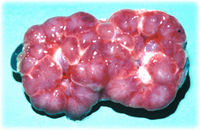Difference between revisions of "Lizard and Snake Immune System"
| (11 intermediate revisions by 4 users not shown) | |||
| Line 1: | Line 1: | ||
| − | {{ | + | {{OpenPagesTop}} |
| − | The immune system of lizards and snakes is influenced by age, nutrition, general health, ambient temperature and season. In temperate species thymic involution and splenic follicle regression occur seasonally. Antibody production is temperature dependent. The immune system functions most efficiently within a reptile's [[Preferred optimum temperature zone]] although at a low level in comparison to birds and mammals. In captivity, lizards and snakes that are kept below their [[Preferred optimum temperature zone|POTZ]] are immunocompromised and are therefore predisposed to infection with opportunistic pathogens. | + | [[Image:Boa_spleen_crop.jpg|200px|thumb|right|'''Boa constrictor spleen''' (Copyright © RVC)]] |
| − | [[Category:Lizard_Physiology]][[Category: | + | The immune system of lizards and snakes is influenced by age, nutrition, general health, ambient temperature and season. In temperate species thymic involution and splenic follicle regression occur seasonally. Antibody production is temperature dependent. The immune system functions most efficiently within a reptile's [[Preferred optimum temperature zone|preferred optimum temperature zone (POTZ)]] although at a low level in comparison to birds and mammals. In captivity, lizards and snakes that are kept below their [[Preferred optimum temperature zone|POTZ]] are immunocompromised and are therefore predisposed to infection with opportunistic pathogens. |
| + | |||
| + | * '''Find out more about [[:Category:Lizard Diseases|lizard diseases]]'''. | ||
| + | * '''Find out more about [[:Category:Snake Diseases|snake diseases]]'''. | ||
| + | |||
| + | |||
| + | {{Learning | ||
| + | |full text = [http://www.cabi.org/cabdirect/FullTextPDF/2009/20093118394.pdf '''Clinical reptile immunology: antibodies to blood cells.''' Mitchell, M. A.; The North American Veterinary Conference, Gainesville, USA, Small animal and exotics. Proceedings of the North American Veterinary Conference, Orlando, Florida, USA, 17-21 January, 2009, 2009, pp 1788, 5 ref.] | ||
| + | }} | ||
| + | |||
| + | |||
| + | {{review}} | ||
| + | |||
| + | {{OpenPages}} | ||
| + | |||
| + | [[Category:Lizard_Physiology]] | ||
| + | [[Category:Snake Physiology]] | ||
Latest revision as of 16:36, 18 August 2012
The immune system of lizards and snakes is influenced by age, nutrition, general health, ambient temperature and season. In temperate species thymic involution and splenic follicle regression occur seasonally. Antibody production is temperature dependent. The immune system functions most efficiently within a reptile's preferred optimum temperature zone (POTZ) although at a low level in comparison to birds and mammals. In captivity, lizards and snakes that are kept below their POTZ are immunocompromised and are therefore predisposed to infection with opportunistic pathogens.
- Find out more about lizard diseases.
- Find out more about snake diseases.
| Lizard and Snake Immune System Learning Resources | |
|---|---|
 Full text articles available from CAB Abstract (CABI log in required) |
Clinical reptile immunology: antibodies to blood cells. Mitchell, M. A.; The North American Veterinary Conference, Gainesville, USA, Small animal and exotics. Proceedings of the North American Veterinary Conference, Orlando, Florida, USA, 17-21 January, 2009, 2009, pp 1788, 5 ref. |
| This article has been peer reviewed but is awaiting expert review. If you would like to help with this, please see more information about expert reviewing. |
Error in widget FBRecommend: unable to write file /var/www/wikivet.net/extensions/Widgets/compiled_templates/wrt66496c9e5cb494_45336381 Error in widget google+: unable to write file /var/www/wikivet.net/extensions/Widgets/compiled_templates/wrt66496c9e611b98_89436328 Error in widget TwitterTweet: unable to write file /var/www/wikivet.net/extensions/Widgets/compiled_templates/wrt66496c9e64e8a7_70277901
|
| WikiVet® Introduction - Help WikiVet - Report a Problem |
